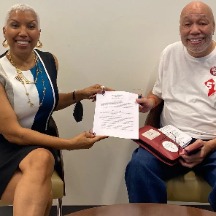Initiative 83, the “Ranked Choice Voting and Open the Primary Elections to Independent Voters Act of 2024”, would require politicians and political candidates to work harder for constituent votes. The ballot initiative’s reforms give a voice to the one in six D.C. voters, Black and White, rich and poor, veterans and workers, who are registered as independent and can’t participate in primary elections by allowing them to vote in the primary of their choosing. It would further make politicians work harder for everyone’s vote through the implementation of ranked choice voting and requiring over 50% support to win election.
As D.C. is overwhelmingly Democratic, the winner of most general elections are decided in the primary elections, meaning that independent voters currently cannot vote in the election that ultimately chooses their elected officials, including their mayor, their attorney general, or their city councilmember. Initiative 83 would allow over 73,000 disenfranchised independent voters to vote in taxpayer-funded primary elections for the first time since Home Rule. Once implemented, independent voters would contact the D.C. Board of Elections and choose one party’s primary to vote in prior to that primary election. When the voter goes to the polls or receives their ballot by mail, their ballot will reflect whichever party they have chosen for that election cycle.
Ranked choice voting is a proven system to hold politicians accountable to a majority of voters. Our current winner-take-all system requires strategic voting to avoid “splitting the vote,” creating situations where voters feel pressured to vote for the “electable candidate” over the person they would most like to support. Ranked choice voting remedies this by creating a system where voters rank their candidates in order of preference.
DC Set to Vote on Rank Voting - What Is It?

It is straightforward: if your top candidate finishes with the least first place votes, your ballot counts for your second choice, and so on. This cycle of instant runoffs continues until a candidate has amassed over 50% of the vote. Ranked choice voting in D.C. would motivate politicians to campaign beyond their primary bases, build broad coalitions, and appeal to more communities, including communities east of the river who are often ignored under the current system.
On August 2nd, The Yes on 83 Campaign (formally known as Make All Votes Count DC and the sponsors of Initiative 83) met the statutory requirements to place Initiative 83 on the November 2024 general election ballot. This was a momentous achievement for the campaign and will give DC voters – including the over 40,000 who signed petitions for Initiative 83 – the option to approve this measure on November 5th.
Should Initiative 83 be approved by a majority of D.C. voters in the general election on November 5, it will then need to be certified by the D.C. Board of Elections in early December. The Chairman of the D.C. Council would then transmit the law to the 119th Congress in January to begin the 30 legislative day review period and likely become law by early March 2025. The first election that would feature the reforms outlined in Initiative 83 would be the District’s primary election in June 2026.
On August 2nd, The Yes on 83 Campaign (formally known as Make All Votes Count DC and the sponsors of Initiative 83) met the statutory requirements to place Initiative 83 on the November 2024 general election ballot. This was a momentous achievement for the campaign and will give DC voters – including the over 40,000 who signed petitions for Initiative 83 – the option to approve this measure on November 5th.
Should Initiative 83 be approved by a majority of D.C. voters in the general election on November 5, it will then need to be certified by the D.C. Board of Elections in early December. The Chairman of the D.C. Council would then transmit the law to the 119th Congress in January to begin the 30 legislative day review period and likely become law by early March 2025. The first election that would feature the reforms outlined in Initiative 83 would be the District’s primary election in June 2026.
Advertisers | Contact Us | Events | Links | Media Kit | Our Company | Payments Pier
Press Room | Print Cover Stories Archives | Electronic Issues and Talk Radio Archives | Writer's Guidelines






